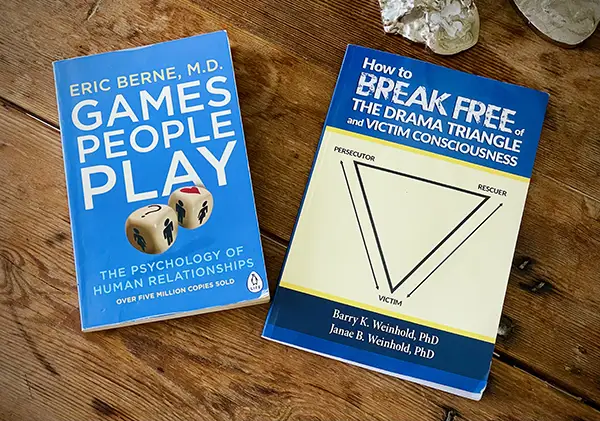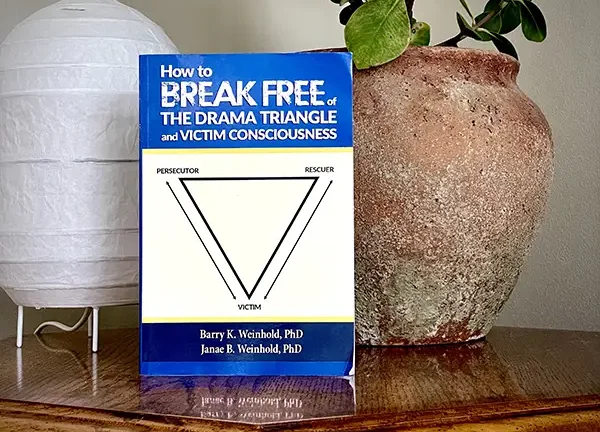Understanding the Drama Triangle: A Review of “How to Break Free of the Drama Triangle and Victim Consciousness”
In this review, we delve into the book “How to Break Free of the Drama Triangle and Victim Consciousness” to decipher the enigmatic Drama Triangle, explore the concept of Victim Consciousness, and find out how this book can be a guiding light to escape dysfunctional relationship dynamics.
Unraveling the Drama Triangle
Have you ever felt trapped in a ceaseless cycle of conflict, tension, and emotional turmoil? Perhaps at work, with friends, or even within your family? If so, the Drama Triangle might be a concept you’re familiar with – a psychological construct derived from Transactional Analysis.
Decoding the Dynamics
The Drama Triangle is a complex game that involves interchangeable roles: Victim, Rescuer, and Persecutor. The book, “How to Break Free of the Drama Triangle and Victim Consciousness,” serves as an essential tool for understanding and breaking free from this destructive cycle.
Video Book Review: How to Break Free of the Drama Triangle and Victim Consciousness
Insights from “Games People Play”
Eric Berne’s “Games People Play,” written in 1961, dissects mind games that people enact through predictable social transactions. These interactions, though appearing normal, often mask emotionally dishonest motives. The book exposes the manipulation and dysfunction underlying these game transactions, shedding light on their roots in warped childhood experiences and societal influences.
The Drama Triangle Unveiled
At its core, the Drama Triangle is a dysfunctional social game, a fusion of various aforementioned games. It involves three roles: Victim, Rescuer, and Persecutor, and thrives on a continuous rotation of these roles. This perpetuates a cycle of drama, characterized by shifts in power dynamics and emotional tension.

Understanding Victim Consciousness
The Drama Triangle ties closely with Victim Consciousness – a mental state where individuals view themselves as powerless and attribute their emotions to external factors. This mindset not only reinforces feelings of helplessness but also draws Rescuers and Persecutors into the dynamic. The book deeply delves into Victim Consciousness, providing insight into its influence and strategies to break free from its grasp.
Escaping the Drama Triangle
Escaping the Drama Triangle demands self-awareness and concerted effort. The book offers a roadmap to liberation:
- 1. Direct Communication: Expressing thoughts and emotions transparently, without blame, dismantles the cycle.
- 2. Refusing the Rescuer Role: Help others only upon request or permission.
- 3. Reclaiming Projections: Examine judgments to uncover self-reflections.
- 4. Healing Traumas: Address triggers stemming from unhealed traumas.
- 5. Authentic Expression: Convey thoughts and feelings in the moment, fostering genuine communication.
Empowering Through Communication
Direct communication stands as a potent tool against the Drama Triangle. It involves expressing thoughts, feelings, and needs openly, creating an environment where relationships thrive without power dynamics.
Key Takeaways
The path to authentic, autonomous interactions begins with awareness. Recognizing and eliminating participation in these social games is pivotal. Books like “Games People Play” and “How to Break Free of the Drama Triangle and Victim Consciousness” foster awareness, enabling the dismantling of dysfunctional communication patterns.
Navigating the Transformation
Embracing this journey isn’t without its challenges. Disengaging from these games might label you the ‘bad guy’ and test your resolve. Others accustomed to the drama might resist the changes you make to your life. Nevertheless, this transformation is crucial for personal growth.
Book Verdict
“How to Break Free of the Drama Triangle and Victim Consciousness” presents complex concepts in a succinct and clear manner. Its efficiency in conveying insights makes it a valuable resource. It’s easier to comprehend than “Games People Play,” but in the end I recommended you to explore both books for a comprehensive understanding Transactional Analysis.
By grasping the fundamentals of Transactional Analysis and the Drama Triangle, readers gain a fresh lens to perceive dysfunction in various spheres of life, from family dynamics to workplace interactions and even media portrayals.
All in all, “How to Break Free of the Drama Triangle and Victim Consciousness” offers a profound perspective on human interactions, encouraging readers to escape the cycle of drama and cultivate genuine relationships.
Further Reading: Dysfunctional Communication
For those captivated by these ideas, here are additional review of books I recommend;
- “Games People Play” by Eric Berne
- “Radical Honesty” by Brad Blanton
- “The Human Magnet Syndrome” by Ross Rosenberg
⭐️ ⭐️ ⭐️ ⭐️ ⭐️ out of 5
Find more great books to read on my the Great Books List
Video Reviews every week on YouTube and support the BookLab mission on Patreon


